Wish You Were Here
album
by Badfinger
compiled by Tom
Brennan
last update:
August 08, 2024
WISH YOU WERE HERE
April 7-July 27, 1974
Caribou Ranch Studios, Colorado,
U.S.A. and AIR Studios, London
Chris Thomas
Expanded
Edition released on November 2, 2018 on
Real Gone/Rhino RGM-0758
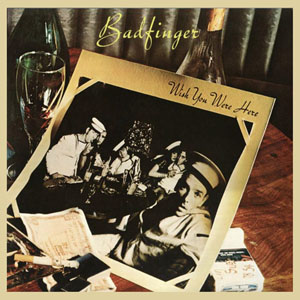
Tracks:
01.
Just A Chance (2:58)
02. Your So Fine (3:03)
03. Got To Get Out Of Here (3:30)
04. Know One Knows (3:16)
05. Dennis (5:15)
06. In The Meantime/Some Other Time (6:45)
07. Love Time (2:18)
08. King Of The Load (3:30)
09. Meanwhile Back At The Ranch/Should I Smoke (5:18)
Bonus
Tracks:
10. Queen
Of Darkness (Evans) [unreleased song] (2:38)
11. Just A Chance [2018 alternate mix] (3:18)
12. Your So Fine [2018 alternate mix] (3:04)
13. Got To Get Out Of Here [2018 alternate mix] (3:28)
14. Know One Knows [2018 alternate mix] (3:20)
15. Dennis [2018 alternate mix] (6:03)
16.
In The Meantime/Some Other Time [2018 alternate mix] (6:57)
17. Love Time [2018 alternate mix] (2:36)
18. Meanwhile Back At The Ranch/Should I Smoke [2018 alternate mix]
(5:29)
Studio
work: Dan Matovina
Reissue Design: Tom D. Kline
Thanks to: Chris Thomas and Tom Brennan
So Fine (Record
Store Day 2019 red vinyl limited edition of 2000 copies) - Sides
C and D
released
on April 13, 2019 on
Real Gone Music/Rhino Custom Projects OPLP-9028
Laquer Cutting by John Golden at Golden Mastering
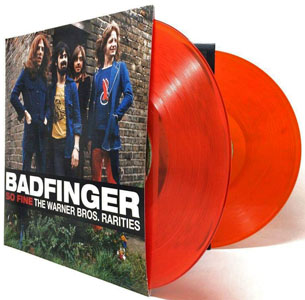
Front cover photo courtesy of Barry Wentzell
Gatefold photo courtesy of Michael Putland
Compilation produced by Gordon Anderson and Dan Matovina
These 2018 remixes by Dan Matovina were done from the original Wish You
Were Here multi-tracks in order to showcase unused, hidden, or buried
parts. They are designed partly for the pure enjoyment of fans and
partly for Badfinger scholars to study the process of the creation of
the record, as produced by Chris Thomas. These were not done as
competitive or alternate mixes of a “final” new mix, as the Giles Martin
remixes of The Beatles’ Sgt. Pepper’s Lonely Hearts Club Band and The
White Album were...
Just A Chance – alternate mix
On this 2018 remix, you first hear the band warming up to play the song.
Soon thereafter, you hear horns as played by The Average White Band’s
horn section, Malcolm Duncan and Roger Ball (as arranged by Roger Ball).
These parts are turned up louder than on the record. The acoustic rhythm
guitar that plays the basic riffs and some accented strums is raised, as
are unison lead vocals of Pete Ham with Tom Evans. There is a long
electric guitar slide part into the guitar solo section here that was
not heard on the record, and a bit of Joey Molland’s alternate attempt
at a guitar solo is now merged into Pete Ham’s guitar solo from the
original record.
Your So Fine – alternate mix
This remix brings to the fore harmonica parts by Pete Ham, which were
not used or quite buried on the original release. There was a second
take of the guitar solo and you hear both the original and outtake solos
mixed together. There is also turned up a blanket pad of background
vocal “ahh”s that come in twice, of which Tom Evans is the most
prominent voice.
Got To Get Out Of Here – alternate mix
The highlight here is a fantastical arrangement of horns, mini-moog,
harmonium, and organ parts that ended up essentially gone or buried on
the original record. A little “Penny Lane” in its approach, but these
parts were thought to take away from Joey Molland’s intense lyrical
expression of his frustrations of what was going on around him. Organs
remained on the final version, but you can hear his voice a bit clearer
here.
Know One Knows – alternate mix
This remix showcases a previously unused, ARP Odyssey Synthesizer part
on the intro. Pete’s lead vocal can now be heard, as joined by unisons
from Tom Evans. In the solo section, Japanese singer Mika’s
controversial talking-bit is taken out. The unison leads by Pete Ham are
brought forward. Anne Odell, who wrote, arranged, and conducted all of
the string parts on the record (as played by the Martyn Ford Orchestra)
are now up louder, or, where they were missing on the original record.
On the tail-out ending fade, you hear Tom Evans mimic a horn bit and
Pete Ham chuckle in response.
Dennis – alternate mix
Here the lead vocal by Pete Ham is louder, as are his harmonies. This
change emphasizes the intense lyrics about Pete’s paternal love of
Blair, son of his new beau at the time, Anne Ferguson. There are fills
and mini-lead guitar parts by Ham brought up. The “dit dit” background
vocals also are up. The end of the original version has a long drawn out
build in which elements were subtly brought in. On this remix, these
parts, as played by piano, electric piano, organ, guitar, and
harpsichord, are at times recorded at half-speed and then sped up to
brighten the playback sound. Some extra effects are brought in even
louder than before and more dramatically. You also get to hear the full,
six-minute extended version of the take.
In The Meantime / Some Other Time – alternate mix
On this remix, Anne Odell’s creative orchestral warming-up intro is a
bit longer, with the Average White Band horns up, too. The constant
winding lead guitar in the song by Pete Ham is up in the mix, and
whereas before, the orchestra and horns burst in and out, those parts
are now modified to allow some new nuances in the arrangement to be
heard. Background vocals are also up to hear the words more clearly.
When Joey’s “Some Other Time” kicks in on the medley, his harmony vocal
is made more prominent and the lead vocal is brought behind. At the end
of the original was a lead backward guitar played by Ham; you now hear
an unheard second take added. The end ringing chords by the horns are
extended a bit, instead of the abrupt end of the original.
Love Time – alternate mix
Joey Molland’s pretty ballad is embellished here with examples of his
carefree humor to break the studio monotony, as he riffs vocally with
non-sequiturs on a track while waiting to sing. Pete’s background vocals
are now clearly distinguishable by him on bridges. The lead guitar by
Pete is used here with Molland’s harmony, creating a nice effect.
Meanwhile Back At The Ranch / Should I Smoke –
alternate mix
Pete Ham plays all leads on this medley. On an earliest Caribou rough
mix, you hear him singing the guitar solo melody he wanted. Later, for
effect, Thomas had Pete singing simultaneous to his mid-point lead with
a simultaneous blowing in paper-and-comb buzzing effect. In this remix,
you can hear him take a breath from his breathing into the
paper-and-comb halfway through. Thomas also claimed there could be as
many as six guitars subtly mixed together to help get Pete’s “big”
guitar sounds. The Average White Band horn section is brought up louder
here. Finally, the long resting notes of all the instruments are run out
until they disappear, similar to the final chord of The Beatles’ “A Day
in the Life.”
Queen Of Darkness – previously unreleased song mixed
2018
This Tom Evans song was never fully completed, so you hear a scratch
lead vocal. This straightforward rocker has lead guitar by Pete Ham and
sounds much like a song from the Ass era. An acoustic demo from that
time, without the bridges here, came out on release in 2000. A snappy,
good-timey addition for the fans of Tom and Badfinger.
Original
vinyl releases:
U.S. release on October 14,
1974 on WB BS 2827 [Test
pressing information for U.S.: August 1, 1974] [front
cover | back
cover] [promo stickers]
U.S. RCA Music Club Edition R113746 [side 1 label | inner groove RCA matrix number | credits]
Billboard chart positions: #173 (Nov. 9, 1974), #162 (Nov. 16, 1974),
#151 (Nov. 23, 1974), #148 (Nov. 30, 1974), #172 (Dec.
7, 1974), #165 (Dec. 14, 1974).
Cash Box chart positions (top 175 album chart): #175 (Nov. 16, 1974),
#173 (Nov. 23, 1974), #173 (Nov. 30, 1974).
Special edition green vinyl release on January 23, 2018 on Rhino/Ada
RHO1-2827: [full
cover and side 1 vinyl | front
cover | back
cover | side 1 label | side 2 label]
U.K. release circa December, 1975 on WB K56076 [side
1 label | side
2 label | release announcement from Music Week, 1976 Jan 10]
Side One [label]:
Just A
Chance (Ham)
Your So
Fine (Gibbins)
Got
To Get Out Of Here (Molland)
Know
One Knows (Ham)
Dennis (Ham)
Side Two [label]:
In The
Meantime (Gibbins)
Some
Other Time (Molland)
Love Time (Molland)
King
Of The Load (Evans)
Meanwhile
Back At The Ranch (Ham)
Should
I Smoke (Molland)
Average White Horns played on "Just A Chance" and "Should I Smoke,"
arranged by Roger Ball
Orchestrations by Anne Odell (Martyn Ford Orchestra)
Engineers: Que Guercios [Jeff
Guercio] (Caribou), Chris Thomas (Caribou), Bill Price (AIR),
Garith Guinness (AIR)
Art Direction: Michael Doud (AGI)
Photography: Joe Gaffney
Design: Geoff Halpin (Bloomsbury Group)
Tom Evans story thanks to Lee
Shafer (Kingston, PA):
"Tom said a
funny thing happened. During the cover shoot, it took a long time to
make the table look messy like a long drinking session had been
going on, and it took SO long that they all had been drinking all
day and Tom said "I spewed" so they had to set the table up again!"
CDs
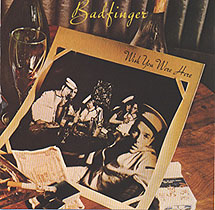
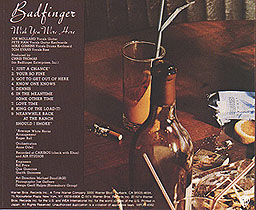
Japanese
release on July 25, 1991 on Warner
Brothers WPCP-4082
German
release on January 17, 1997 on 7599-26540-2 (WE 835)
release
on July 1, 1997 on WEA 265402
release
on March 18, 1998 on Warner
Brothers
7599265402
U.S.? release on April 25, 2000 on Warner Brothers 26540
release on September 23, 2003 on WEA 7599265402
U.S. release on November 30, 2004 on Rhino/Warner Brothers
U.K. release on July 23, 2007
on Collector's Choice CCM-810
U.S. release on
September 18, 2007 on Collector's Choice
CCM-810
U.K. release on October 28, 2013 on Rhino/Edsel
EDSK 7036
U.S. release on November 5, 2013 on Rhino/Edsel EDSK 7036 (U.K.
import)
U.S. release
(Expanded Edition) on November 2, 2018 on Real Gone/Rhino
RGM-0758
Cassette
tape
WB MS-2827
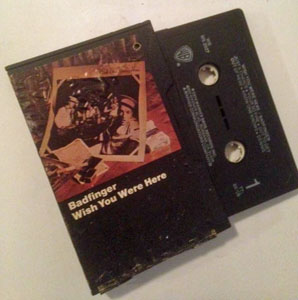
8-track
tapes
WB M-82827
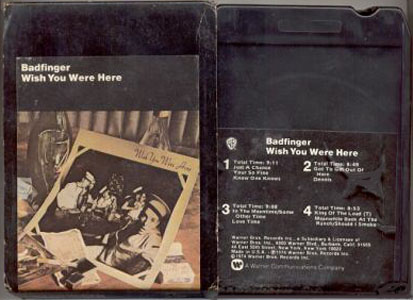
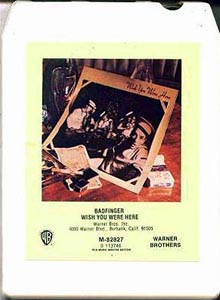
Program 1:
Just A Chance
Your So Fine
Know One Knows
Program 2:
Got To Get Out Of Here
Dennis
Program 3:
In The Meantime/Some Other Time
Love Time
Program 4:
King Of The Load (T)
Meanwhile Back At The Ranch/Should I Smoke
Studio
tapes
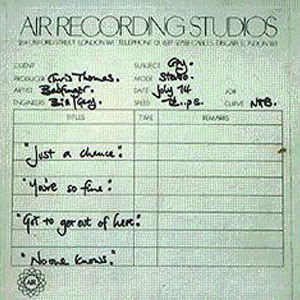
AIR
Studios stereo mix tape copy from July, 1974:
Just A Chance
You're So Fine
Got To Get Out Of Here
No One Knows
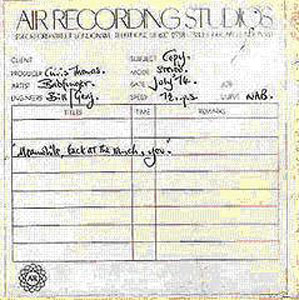
AIR
Studios stereo mix tape copy from July, 1974:
Meanwhile, Back At The Ranch, You
Badfinger
in AIR Studios, London: July, 1974 thanks to
Brooke from Richmond, VA
Album
reviews:
Cash
Box: October 26, 1974
NME (Imports section): November 9, 1974 (U.K.)
Phonograph:
November, 1974
MuziekKrant:
November, 1974 (Germany)
Rolling
Stone: January 2, 1975 (U.S.)
The
Leader Post, Regina: February 07, 1975 (Canada)
Brandon
Sun, Manitoba, CANADA: February 08, 1975
Creem:
February, 1975
Let
It Rock: November/December, 1975 (U.K.)
Review
by Jon Ferguson
News:
Badfinger
Hit by WB Demand - Billboard: January
11, 1975
PROMOTIONAL MATERIALS
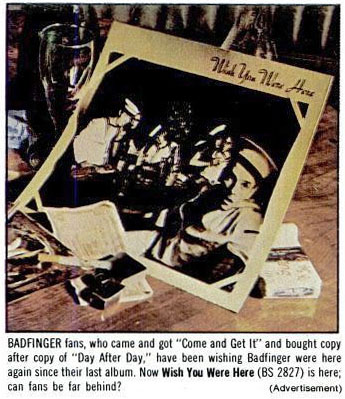
above: October 19,
1974 ad from Billboard magazine
One
Badfinger can get the whole hand going - ad from Billboard magazine
listing previous hit singles
Badfinger did an endorsement for Sunn Amps that included photos of them
during the "Wish You Were Here" sessions:
Sunn Amp ad by Badfinger
"The Force" promotional ad for October 1974 Warner Brothers album
releases - Billboard magazine: October 19, 1974
Record
Sales (new releases)
Crazy
Bruce's Sound Corner ad from Daily Chronicle, DeKalb, Illinois:
October 28, 1974
The
Nickelodeon record store ad from The Sheboygan Press: November 07,
1974
Hudson's
Bay Company ad from Victoria Times: November 20, 1974
Swallen's
Holiday Gift Guide ad from The Cincinnati Enquirer: November 28,
1974
Smitty's
Department Stores ad from The Arizona Republic, Phoenix, AZ:
December 5, 1974
Big
Hits Are On... Warner Brothers. Reprise ad from The Record, Bergen
County, NJ: December 11, 1974
Record Sales (clearance)
Opus
69 store, Winnipeg Free Press: March 31-April 05, 1975
The
Wherehouse, San Francisco Examiner: December 12, 1975
Radio Spot
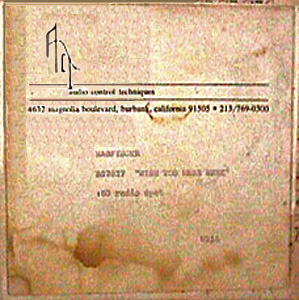
The radio
commercial used clips from 7 different songs on the LP.
The one-minute commercial consists of the following:
[intro from In The Meantime]..."Badfinger...[excerpt from In
The Meantime]...Badfinger...[excerpt from Just A Chance]...Badfinger...[excerpt
from Love Time]...Badfinger...[excerpt from Got To Get Out
Of Here]...Wish You Were Here...[excerpt from Know One Knows]...a
really great new album...[excerpt from Your So Fine]...on Warner
Brothers Records and Tapes...[excerpt from Dennis] (fades out)."
CARIBOU
RANCH STUDIOS
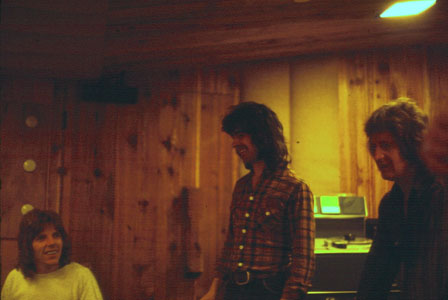
photo
by Brian Gary Varga
Photos
of Badfinger at Caribou Ranch
Badfinger
taking a break at Caribou Studio: April, 1974 (photo by Koh
Hasebe/Shinko Music)
History
of Caribou Ranch Studios:
Northwest of Nederland, far from the madding crowds of Los Angeles,
Jim Guercio built a recording studio that became the object of desire
for some of the '70s most famous musicians. He had already established
himself as one of the industry's long ball players, with an extensive
history of playing and production credits extending back to the
Buckinghams in the mid-'60s, including the Beach Boys, Frank Zappa and
especially Chicago, whom Guercio managed from their days as an obscure
L.A. club band to mega-stardom through the '70s. Although he is rightly
regarded in the rock annals as a top flight producer, successful manager
and owner of one of the best recording facilities in America during this
period, he is still cheerfully remembered in the press as "ex-Beach Boy
Jim Guercio," having filled in on a few early-'70s Beach Boy tours.
Funny, sometimes, the things that stick...
Caribou Ranch was as much spa and mountain retreat for rock superstars
during the seventies as it was a place to work. Several comfortably
attended cabins dotted the grounds around the studio, which Guercio
built inside a renovated barn. The relative proximity of the posh guest
cabins-as well as the gated privacy-led inevitably to wave after wave of
rumored substance-inspired madness.
Guercio brought the creme of rock super-stardom not just to Caribou, but
to Nederland and Boulder as well. You could be walking down Pearl Street
one day and pass Mick Jagger or Don Henley or Joni Mitchell or Bernie
Taupin, and that was only because Caribou was just up the hill.
The lasting legacy of Caribou, of course, is some of the best-recorded
work from some of the best rock players in the '70s. Chicago cut several
of its biggest early hits there. Stephan Stills recorded his timeless
and still-fresh first solo album at Caribou, and Elton John recorded
three massive-selling albums there. When you hear Joe Walsh's immortal
"Rocky Mountain Way," guess what his view was.
Lesser known artists also worked there, like George Duke, the German
prog outfit Lake, Jan Hammer and Supertramp - who's arguably best LP
"Even In The Quietest Moments" features a picture of a snow-draped piano
outside Caribou. Lead singer Roger Hodgson, in search of that perfect
vocal take, actually recorded part of one song in a freight elevator.
Rumor has it that Caribou had more platinum albums hanging on its walls
than any other studio in America. When the studio, along with many
irreplaceable master tapes, burned in March of 1985, a piece of rock
history danced skyward on its fading embers. Caribou, the Legend had
passed into history as one of rock and roll's greatest places,
surrounded by one of the greatest places on earth.
thanks to Paul
Nyman
back to The
Iveys & Badfinger releases
© Copyright 1998-2024 Tom
Brennan's Badfinger Library. All Rights Reserved.
Reproduction in whole or in part in any form or medium without
permission is prohibited.
All trademarks used are the property of their respective owners.











